
| Home | Genealogy | Photos | Odds & Ends | |
| Kerr | Vawter | Plond | Madsen | All |

|
|
||||||||||
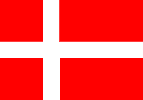
|
Plond and Madsen Families |
born in 1812
Born in Ravnkilde, Denmark. Married Mette Catherine Christiansdatter (born 1816), daughter of Christen Nielsen (born 1790 in Fraer, Denmark) and Johanne Christensdatter (born 1788) . Then had had two sons, Niels and Peter. Census lists Jens as the farm manager for his mother-in-law, Johanne Christiansdatter, who is listed as a pot maker.
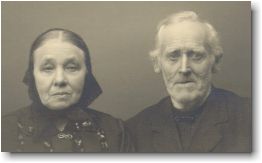 Niels Jensen
Niels Jensen
11-16-1846 to 1-28-1931
Married Ingre Marie Jensen (7-9-1856 to 5-10-1946). Ingre was the daughter of Jens Sorensen (born 1803 in Volsted, Aalborg, Denmark) and Karen Kirstine Jacobsdatter (born 1815 in Sonderholm, Aalborg, Denmark). Niels and Ingre had three children: Jens Peter Kristian Jensen (b. 12-7-1884), Ottinius Jensen (b. 10-23-1892) and Anna Elizabeth Jensen (b. 5-28-1888).
On 4-22-1904, Niels' and his children's last name was legally changed to Plond.
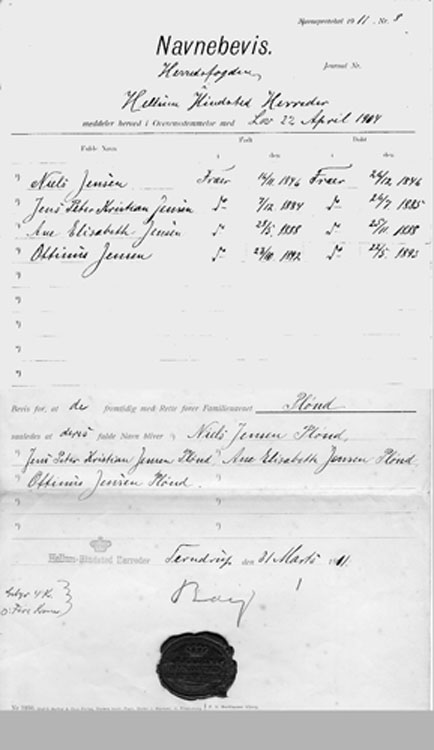
Niels and his brother Peter both initially used Jensen as their last name. But in the 1880 Census and again in the 1890 Census, both Niels and Peter were using the last name of Pløn.
Years ago, many years ago, a Dane's last name was based upon their father's first name. So the son of Jens Andersen would be 'whatever' Jensen, while his daughter would be 'whatever' Jensdatter. Naturally this led to lots of confusion, with the result that many Danes had two names, their "church name" based on their father's name and a common name based upon their village or occupation.
When I asked my grandfather Jens why the family name was changed from Jensen to Plond, he said it was because "way back when one of my grandfathers used to go to the town of Plond in Germany, buy cattle and drive them back to Fraer." Curiously enough Otto's grandson recalls the same explanation from his grandfather.
Thing of it is, there is no town in Germany with the name Plond. There is, however, a Plön in the Schleswig-Holstein region of Germany, just south of the Danish-German border. An area that until the Second Schleswig War in 1864 belonged to Denmark.
So, could Niels and Peter be the guys who went to Plön to buy cattle and became known Pløn? Could be. So why did they spell the name Pløn and not Plön? Maybe because there is no ö in Danish and the closest letter is ø? How Pløn became Plond is another question. Could have been the result of an Ellis Island clerk not knowing how to spell Pløn.
Here's the official name change document in Danish, indicating Niels Jensen, Jens Peter Kristian Jensen, Ane Elizabth Jensen and Ottinius Jensen now (as of April 22, 1904) have the last name of Pløn.
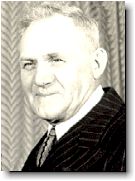 Jens Peter Kristian Jensen Plond
Jens Peter Kristian Jensen Plond
12-7-1884 to 1-1-1982
Born in Fraer Denmark, came to America in 1904 on the White Star liner Oceanic. Then after returning to Denmark, he came back to America on the Lusitania in 1911. Once back in America, he married Anna Madsen from Aars, Denmark. They settled in Audubon, Iowa. Jens and Anna had four children: Karen Ingre (1913), Edith, Frances, and James.

The little town of Fraer, Denmark. Jens's home is the thatched roof, stone building on the right.
A torn post card of the Lusitania, kept by Jens.
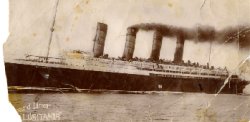
Immigation documents show that Jens Jensen Plond arrived 2-3-1911 via Ellis Island, born about 1885, Port of Departure: Liverpool. Place of Origin: Scandinavian. Ship: Lusitania. His occupation is listed as "drainer", yes, clearly "drainer". Name of nearest relative in country of origin: "Father: Niels Plond, fraer".
Along with Jens, came his brother Ottinius Jensen Plond, both from Fraer, both going to Audubon, Iown. Ottinius ("Uncle Otto") is listed as a "miller". Otto Plond (10-23-1892 - 4-25-1957) married Jane Hollen Beck and they had a son, Donald LeRoy Plond (12-10-1933 - 8-27-1998).
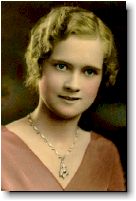
Mar. 16, 1913 to Dec. 5, 1990
Born and lived her early years in Audubon, Iowa, a town were the churches, schools, neighbors all spoke Danish. Karen did not learn to speak English until she was seven years old. Married Arleigh Robert Kerr in 1946 and they had one child: Arleigh Robert Kerr, Jr. born in 1950.
born in 1796
Married to Mette Marie Albertsdatter (born in 1797).
Mads Nielsenborn in
Married to Christine Nielsen, born 1827 in Farstrup, Aalborg, Denmark.
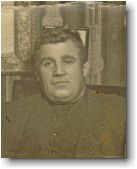 Lars Madsen
Lars Madsen
1861 to 1926
Born in Barmer, Denmark; died in Aars. In the 1890 census, Lars is listed as a farmer. On U.S. immigration documents for daughter, Anna in 1911; she says her father was a brewer. Lars married Karen Maria Jorgensen and they had six children: Hanna, Christian, Anna (2-5-1893), George, Katrina and Johan (born about 1890). After Karen died in 1911, Lars married Hasina Posborg and they had three children. Aage Christian Madsen (b. 1913), Viggo Madsen (b. 1914),and Arne Madsen (b. 1919). Aage moved to Johannesburg, South Africa and opened The Three Vikings Restaurant.
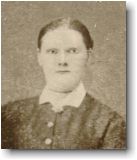 Karen Maria Jorgensen
Karen Maria Jorgensen
1858 to 1911
Karen married Lars Madsen. Born in Mjallerup, the daughter of Jorgen Christian Carlsen (b. 1781) and Johanne Sorensdatter (b.1800). According to the 1860 Census, Jorgen was a "grower" in Logsted. See my Everybody page for Karen Maria Jorgensen ancestors going back to Jens Pedersen (born 1646 in Vilsted, Denmark) and Ana Christensdatter (born in 1660, also in Vilsted).
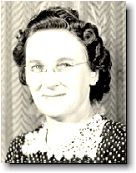 Anna Madsen
Anna Madsen
2-5-1893 to 3-9-1959
Born in Aars, Denmark. She came to America on the SS Oscar II, arriving on 4-19-1911 with her brother Johan Madsen. Anna married Jens Plond and they had four children: Karen Ingre (1913), Edith, Frances, and James.
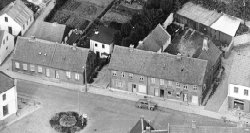
The Madsen house (center, right with the car in front) in Aars where Anna Madsen was born.
The Danish Census Archives is an absolutely fabulous website. They've got all the Danish Census documents going back to 1791 on-line. Wealth of information. Because the wives kept their original names like Karen Madsdatter and they list the parish and town where they were born, it is very easy to track women back to their parents. Couple things to remember, while searching for names or parishes, use Danish spellings. Jörgen, not Jorgen. Frær or Frūr, not Fraer.